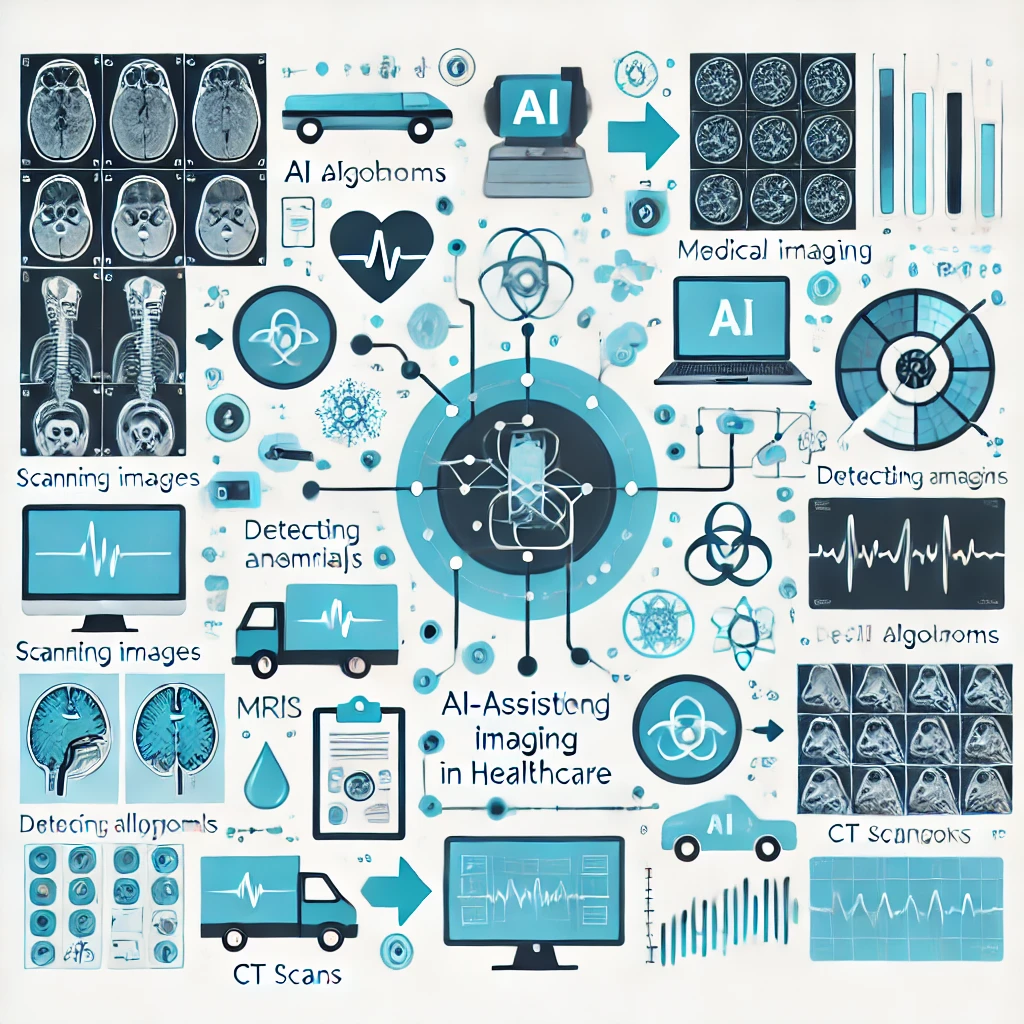Artificial Intelligence (AI) is making a profound impact on the healthcare industry by improving diagnostic accuracy, personalizing treatments, optimizing workflows, and accelerating drug discovery. As AI integrates into medical practices worldwide, it’s poised to make healthcare more efficient, accurate, and accessible. In this article, we’ll explore key areas where AI is revolutionizing healthcare and examine both the opportunities and challenges presented by this technology.
Introduction
The healthcare sector is rapidly adopting AI solutions, transforming various aspects of patient care and operational efficiency. AI applications in diagnostics, personalized medicine, predictive analytics, robotic surgeries, and drug discovery have shown remarkable potential in advancing the industry. For healthcare professionals, AI can simplify tasks, enhance precision, and provide data-driven insights, while patients benefit from faster diagnoses, tailored treatments, and improved outcomes. With AI expected to grow substantially over the next decade, this technology is set to reshape healthcare globally.
AI in Diagnostics and Imaging
AI is revolutionizing diagnostics by analyzing medical images quickly and with high accuracy. By examining X-rays, MRIs, CT scans, and other imaging data, AI algorithms can detect diseases early, sometimes even outperforming human specialists.
Medical Imaging Applications:
- Radiology: AI can detect cancers at an earlier stage, which can be crucial for timely intervention.
- Pathology: AI systems assist pathologists in identifying diseases at a microscopic level.
- Ophthalmology: AI applications screen for diabetic retinopathy, a leading cause of blindness, allowing early intervention to prevent vision loss.
Predictive Analytics for Preventive Healthcare
Predictive analytics is reshaping preventive healthcare by enabling healthcare providers to forecast patient risks, disease outbreaks, and treatment outcomes. AI models analyze patient data and past health records to anticipate potential health issues, allowing for proactive treatment and better resource management.
Examples of AI in Predictive Analytics:
- Risk Assessment: Predictive models identify patients likely to be readmitted, helping doctors prepare personalized care plans.
- Proactive Recovery Tracking: AI tools monitor patient progress, allowing for early intervention in case of complications.
- Population Health Management: AI identifies at-risk groups, helping public health officials allocate resources more effectively.
AI in Personalized Medicine
Personalized medicine leverages AI to tailor treatments based on a patient’s unique genetic makeup, lifestyle, and environmental factors. This precision approach helps in designing therapies that are more effective for individual patients, particularly in complex areas like oncology, cardiology, and genetic disorders.
Key Areas in Personalized Medicine:
- Genomics: AI enables the study of genetic data to identify which treatments are most likely to be effective for individual patients.
- Oncology: AI supports precision cancer therapies by identifying tumor markers and suggesting targeted treatment plans.
- Rare Diseases: Personalized approaches can be life-changing for patients with rare conditions by tailoring interventions to their specific needs.
Enhancing Operational Efficiency with AI
AI optimizes hospital workflows, improving operational efficiency and reducing administrative burdens. By automating tasks such as patient scheduling, recordkeeping, and billing, AI allows healthcare providers to focus more on patient care.
Examples of AI in Operational Efficiency:
- Scheduling Optimization: AI algorithms arrange patient appointments, reducing wait times and managing cancellations.
- Medical Recordkeeping: AI automates data entry, ensuring accurate and up-to-date patient records.
- Billing and Claims Processing: AI streamlines billing, reducing paperwork and processing time.
Robotic Surgeries and AI-Assisted Treatment
AI-driven robotics provide a higher degree of precision in surgeries, leading to shorter recovery times and fewer complications. Robots powered by AI allow surgeons to perform delicate operations with improved accuracy.
Notable Applications in Robotic Surgeries:
- Da Vinci Surgical Systems: Used for minimally invasive procedures, these systems enable surgeons to operate with precision.
- AI-Guided Adjustments: Robotic systems with AI make real-time adjustments during surgery to avoid potential risks.
Accelerating Drug Discovery and Development
AI significantly speeds up drug discovery by identifying potential drug candidates and predicting patient responses to new drugs, shortening the time it takes for life-saving treatments to reach the market.
AI in Drug Development:
- Molecular Identification: AI can identify promising molecular structures faster, accelerating the early stages of drug development.
- Predicting Efficacy and Side Effects: AI models predict how different patient groups may respond to new drugs, improving trial success rates.
- Optimized Clinical Trials: AI selects participants based on genetic profiles and medical histories, streamlining recruitment.
Challenges and Ethical Considerations in AI Healthcare
Despite AI’s advantages, challenges remain, particularly around data privacy, bias, and ethical concerns. The use of patient data in AI systems raises questions about security and confidentiality, and biases in AI algorithms could lead to unequal treatment.
Key Challenges:
- Data Privacy: AI relies on patient data, which requires stringent security measures to protect patient confidentiality.
- Algorithmic Bias: To avoid biased results, AI systems must be trained on diverse datasets.
- Ethical Accountability: It’s essential to establish guidelines for transparency and accountability in AI decision-making.
Market Share of AI in Healthcare (2020-2030)
The AI healthcare market has experienced remarkable growth, with market share increasing from $5 billion in 2020 to a projected $54.5 billion by 2030. The demand for AI-driven solutions is driven by its efficacy in diagnostics, personalized medicine, predictive analytics, and robotic surgeries.
Growth Chart:
- 2020: $5 billion
- 2025: $18 billion
- 2030: $54.5 billion
This upward trend highlights AI’s expanding role in healthcare, with sustained investment fueling innovation and adoption.
Conclusion: The Future of AI in Healthcare
AI is transforming healthcare, from enhancing diagnostic accuracy to personalizing treatments and improving operational efficiency. However, challenges around data privacy, ethical considerations, and algorithmic bias must be addressed to ensure fair and safe AI use. The future of AI in healthcare is promising, with advancements in remote diagnostics, patient monitoring, and democratized access to healthcare set to enhance patient outcomes worldwide. As AI technology progresses, collaboration among healthcare providers, tech companies, and policymakers will be essential to unlock its full potential, making quality healthcare more accessible globally.



